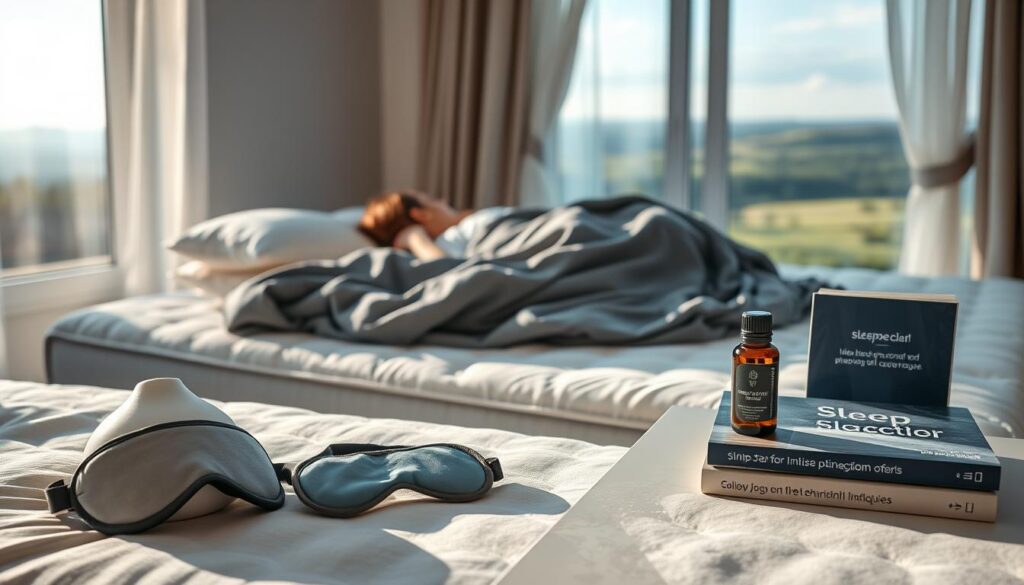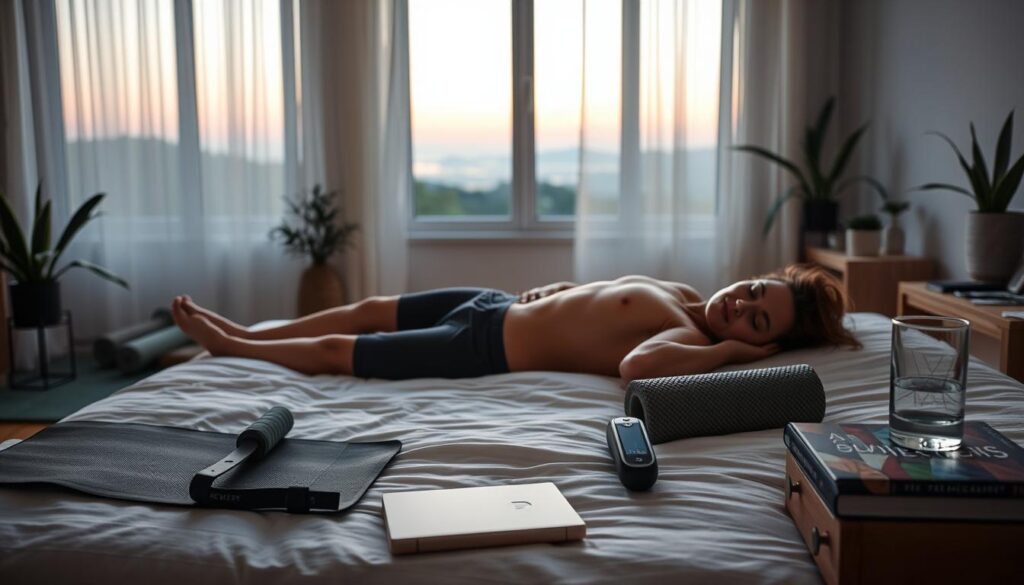Sleep is key to healing your body. It’s not just about feeling tired. It helps fix muscles, boosts energy, and sharpens your mind. This guide shows how sleep can change your recovery.
Today, we often forget how important sleep is. It helps everyone, from athletes to office workers. By changing your sleep habits, you can heal faster, feel less tired, and think clearer.
Get the best supplelment for Sleep here:
Key Takeaways
- Sleep directly impacts how quickly your body heals after physical or mental strain.
- Optimal rest improves muscle repair and supports long-term health goals.
- Simple changes to your sleep environment can boost recovery efficiency.
- Consistent sleep schedules align with natural circadian rhythms to enhance rest quality.
- Recovery through sleep reduces inflammation and supports immune function.
Understanding Recovery Through Sleep
Sleep recovery is when our body fixes tissues, boosts energy, and strengthens our immune system. It’s vital for everyone, from athletes to office workers. Studies show that sleep patterns greatly affect how well we recover physically and mentally.
“Sleep isn’t just downtime—it’s when the body rebuilds itself.” – Dr. Lisa Henderson, Sleep Medicine Specialist
Defining Sleep Recovery
Sleep recovery is the body’s nightly work to fix the damage from the day. During deep sleep, growth hormones help muscles heal. The brain also gets rid of toxins that cause fatigue and brain fog.
Biological Mechanisms at Work
Key processes include:
| Process | Role in Recovery |
|---|---|
| Cerebral spinal fluid flow | Rids the brain of waste |
| Cellular protein synthesis | Repairs damaged tissues |
| Hormonal regulation | Regulates cortisol and melatonin levels |
These processes help muscles heal and the mind refresh. They set the stage for better performance the next day.
The Science Behind Sleep and Recovery
Scientific studies show that sleep is key for recovery. Growth hormones rise during deep sleep, helping muscles heal. This is where improve recovery with sleep begins, as cells fix themselves and stress goes down.
“Sleep is not a luxury—it’s a necessity for the body’s repair systems.” — National Institutes of Health (NIH)
Three sleep stages are vital for recovery:
| Sleep Stage | Recovery Impact |
|---|---|
| Deep Sleep | Muscle repair and immune support |
| REM Sleep | Cognitive restoration and memory consolidation |
| Light Sleep | Body temperature regulation and stress reduction |

Research says 7–9 hours of sleep each night is best. But, sleep issues like insomnia can slow healing. Focusing on these sleep stages helps the body and mind get better.
Quality Sleep: The Foundation for Faster Recovery
Get the best supplelment for Sleep here:
Quality sleep is key for both body and mind to heal. It lets the body use its natural healing powers. This means better recovery and overall health.
Sleep Cycles and Brain Function
The body goes through four stages each night. Each stage is important for getting better. Deep sleep helps remember things, while REM sleep makes us sharper.
- Deep sleep: Boosts memory and repairs neural pathways.
- REM sleep: Enhances creativity and emotional balance.

Impact on Muscle Repair and Regeneration
Sleep is when muscles fix themselves best. Hormones work hard at night to make muscles stronger. This helps avoid injuries and keeps us going longer.
- Protein synthesis: Increases by 20% during sleep, rebuilding muscle fibers.
- Inflammation reduction: Helps muscles recover faster after workouts.
Getting good sleep is not just a good idea. It’s backed by science to help us recover and stay healthy.
Sleep Patterns: How They Influence Recovery Efficiency
Having regular sleep patterns is key to a strong sleep and recovery connection. If your bedtime is all over the place, your body’s repair work slows down. Studies show that waking up at the same time every day helps you bounce back faster after exercise or when you’re sick.

- Bedtime consistency: Going to bed at the same hour nightly improves muscle and brain restoration.
- Duration: 7-9 hours nightly helps maintain hormone balance critical for tissue repair.
| Sleep Pattern | Recovery Impact |
|---|---|
| Irregular sleep | Slowed muscle repair and higher fatigue |
| Consistent schedule | Improved cellular regeneration and energy restoration |
Good sleep is about both how long you sleep and when you sleep. Staying up late can mess with your body’s ability to heal. Keeping a regular sleep schedule helps your body stay in tune with its natural healing cycles. Even small changes, like dimming lights before bed, can help your body adjust and improve the sleep and recovery connection.
Creating an Optimal Sleep Environment for Enhanced Recovery
Starting with your bedroom is key to recharging. A calm, comfy space helps you sleep better. Making small changes can greatly improve your body’s healing during sleep.

Ideal Bedroom Settings
Make your bedroom sleep-friendly. Keep it cool, between 65°F to 68°F, to help your body relax. Use blackout curtains to block out light and signal sleep time.
Reduce noise with a white noise machine or a fan. Even small sounds can break your sleep. So, keep your room quiet for better rest.
- Temperature Control: Maintain a cool room with an AC or fan.
- Light Management: Use blackout curtains and avoid screens before bed.
- Noise Reduction: Use white noise machines or earplugs to block disturbances.
The Role of Technology in Sleep Quality
Technology can be a sleep helper or hindrance. Smart devices like Philips Hue lights dim to reduce blue light. Wearables like Fitbit track your sleep, helping you spot issues.
Avoid screens an hour before bed to keep melatonin levels up. Apps like Calm offer guided relaxation to help you sleep. Choose tech that supports your sleep, not disrupts it.
Investing in these changes turns your bedroom into a recovery space. Focus on environment and tech choices for better sleep and energy. Small changes add up over time to improve your health.
Techniques to Improve Recovery with Sleep
There are many ways to make sleep better for recovery. By using certain methods before bed, you can get more rest. This helps both your body and mind.

Relaxation Methods Before Bed
Relaxing before bed is key for good sleep. It helps your body get ready for deep rest. Here are some tips:
- Deep Breathing Exercises: Breathe in for 4 seconds, hold, then breathe out for 6 seconds. This lowers stress.
- Progressive Muscle Relaxation: Tighten and then relax muscles from your toes to your head. It helps with physical tension.
- Reading a Book: Pick a physical book instead of screens. It keeps blue light away.
Mindfulness Practices for Better Sleep
Mindfulness can also improve your sleep. It calms your mind. Here are some practices to try:
- Meditation Apps: Use apps like Calm or Headspace for guided sessions. They help you get ready for sleep.
- Guided Imagery: Imagine peaceful places to take your mind off stress.
- Journaling: Write down your thoughts before bed. It clears your mind.
“Mindfulness reduces nighttime stress, a key factor in improving sleep,” says the National Sleep Foundation.
Sleep Recovery Myths Debunked
Myths about sleep in recovery can lead to bad habits. Let’s set the record straight with facts.

| Myth | Reality |
|---|---|
| Adults need less sleep with age | Adults 65+ need 7-8 hours; light sleep messes up recovery cycles. |
| Alcohol improves sleep quality | Alcohol breaks up REM sleep, hurting recovery. |
| Short naps hinder nighttime sleep | 20-30 minute naps help stay alert without hurting night sleep. |
“Sleep isn’t optional—it’s a biological necessity for muscle repair and cognitive function.” – National Sleep Foundation
Many think “catch-up sleep” on weekends fixes deficits. But studies show weekend naps don’t fix chronic sleep debt. Your body needs consistent sleep to recover well. Sleep science shows quality sleep is key, not just how long you sleep.
Strategies for Quality Sleep for Better Wellbeing
Improving sleep starts with simple, everyday changes. These steps turn bedtime routines into health boosters.
Establishing a Consistent Sleep Routine
Stick to a regular bedtime and wake-up time, every day. This helps your body’s internal clock work better. A 30-minute wind-down before bed, like reading, tells your brain it’s time to sleep.
- Set alarms for bedtime as well as waking hours
- Avoid screens one hour before bed to reduce blue light exposure
- Use soft lighting in the evening to encourage melatonin production
Nutrition and Its Effect on Sleep
What you eat affects how well you sleep. Stay away from big meals, caffeine, and alcohol before bed. Foods high in magnesium, like almonds or spinach, can help you relax. Drinking too much water before bed can also disrupt sleep.
Addressing Common Sleep Disorders
“Sleep disorders affect 30% of adults. Early intervention improves long-term recovery efficiency.”—National Sleep Foundation
Dealing with insomnia and sleep apnea needs special plans. Cognitive behavioral therapy (CBT) can help with insomnia. For sleep apnea, using a CPAP machine is often necessary.
Wearables can track your sleep to spot problems early. By focusing on these areas, you can improve your sleep quality and overall health.
Sleep Your Way to Better Recovery
Small changes today can lead to big gains in how your body heals. Follow these guidelines to make sleep a priority for faster recovery:

Steps to Achieve Optimal Sleep
- Go to bed and wake at the same time daily. Even on weekends, stay within 30 minutes of your schedule.
- Wind down with 30 minutes of screen-free time. Try reading or stretching to signal your brain it’s time to rest.
- Keep your bedroom at 65°F (18°C) and use blackout curtains to block light disruptions.
Integrating Sleep Practices into Daily Life
Turn routines into habits with these tips:
- Pair evening meals with sleep-friendly snacks like almonds or cherries.
- Use smart alarms like ResMed or Withings to track sleep cycles.
- Replace afternoon coffee with herbal tea to avoid nighttime wakefulness.
“Sleep isn’t an optional luxury; it’s a necessity for health,” says the American Academy of Sleep Medicine.
Start with one change each week. Consistency builds lasting improvements. Your body—and recovery—will thank you.
Improving Daily Habits for Enhanced Sleep Recovery
Get the best supplelment for Sleep here:
Small changes in your daily life can greatly improve your sleep. Start by eating and working out when your body naturally wants to. Don’t eat big meals close to bedtime to avoid stomach trouble. Also, finish hard workouts at least 2 hours before bed.
- Limit screen time 1 hour before bed to reduce blue light exposure.
- Stick to consistent wake-up times—even on weekends—to regulate your sleep cycle.
- Cut caffeine after noon and hydrate early to avoid nighttime bathroom trips.

“Consistency in daily routines strengthens the body’s internal clock, making it easier to fall and stay asleep.”
Replace late-night screen time with relaxing activities like reading or stretching. Short naps of 20 minutes or less are okay. Making these small changes helps you sleep better and recover faster.
Integrating Sleep Recovery into Your Fitness Routine
Combining sleep and fitness builds stronger results. Active bodies need rest to rebuild. Here’s how to align workout goals with restorative sleep:

Pre-Sleep Rituals for Active Minds
Magnesium is also great for sleep. Click here:
- Wind down with 30 minutes of screen-free time
- Try light stretching or yoga to relax muscles
- Use white noise machines or calming music
Post-Exercise Recovery Tips
Timing matters. Avoid intense workouts 3 hours before bed. Pair exercise with these steps:
- Hydrate with electrolyte drinks post-workout
- Cool down with a 10-minute walk
- Choose a bedtime snack like bananas (rich in magnesium)
| Before Bed | After Exercise |
|---|---|
| Read a book | Stretch major muscle groups |
| Avoid caffeine 6 hours pre-sleep | Take protein within 30 mins post-workout |
| Keep room temp at 65°F | Wear compression gear to reduce soreness |
Athletes who sleep 7-9 hours recover 20% faster than those who don’t—National Sleep Foundation
Pairing sleep recovery with smart fitness choices cuts injury risk and boosts endurance. Small changes today build lasting results.
Conclusion
Get the best supplelment for Sleep here:
Sleep is key for fixing muscles and keeping our brains sharp. Getting good sleep helps us perform better in both body and mind. Studies show that rest is vital for recovery after exercise or stress.
Creating a dark, cool sleep space and avoiding screens before bed helps a lot. Small habits like a bedtime routine or fixing sleep issues can make a big difference. Mindfulness and skipping caffeine at night also help.
Good sleep isn’t just nice to have; it’s essential for health. By following these tips, we build strength and reduce tiredness. Valuing sleep lets our bodies heal and grow stronger over time.
